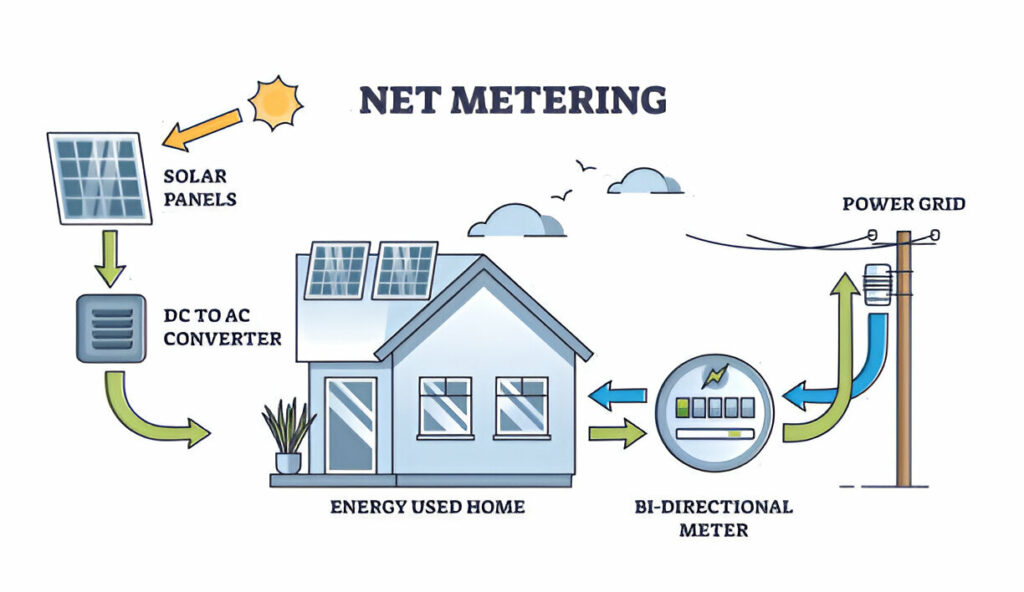Net metering is a solar energy billing mechanism that lets users reduce their electricity costs by sending excess solar energy back to the grid. This system is crucial to the renewable energy mission in India, making solar energy cost-effective for consumers, allowing them to cut down on their electricity bills, thereby helping in a more sustainable environment. Net metering enables users to sell the surplus energy generated by their solar installations to the utility electricity grid, helping them save on utility bills when their solar energy production is insufficient.
This feature enhances the viability of solar energy by charging customers for the net energy they purchase. Which is the difference between the energy they consume and the energy they generate and feed into the grid. Net metering policies have encouraged corporate investment and contributed to expanding public attitudes, primarily in favourable conditions. Enabling net metering ensures that investments in solar energy use will contribute to the green energy transition.
what is net metering?
Net metering (NEM) refers to a billing framework that allows owners of solar energy systems to keep track of the energy contributed to the system and the subsequent cost of the energy consumed. Whenever solar panels generate surplus power after meeting demand. It is available to the grid, which consumers can use. When their solar panels are off – for example, at night or during cloudy days.
The energy provider installs a bi-directional meter at the supply point, and users are charged based on the net energy used, which is the total energy consumed minus the energy they generate. This arrangement reduces the need for customers to buy expensive solar batteries, as any excess energy is available free of cost.
This system works in such a way that users are paid for the surplus energy sold to the grid and are billed only for the net energy consumed. Different states in India have different policies, where some will allow only one meter while others require a two-meter approach; Energy consumed and electricity produced.
Purpose of Net Metering?
Net metering policies are intended to encourage the use of renewable energy and make the benefits of affordable solar power available to power companies. During the peak summer months, solar power reduces the cost of electricity which is valuable to consumers. Although solar net metering remains the most popular, some states have begun to allow net metering for other sources of renewable energy, such as wind turbines, depending on state law.
solar net metering application?
The net metering installation process is done by applying to your local distribution system operator (DISCOM) for permission to install a rooftop solar system. A site survey of the area will be done within three days to see if the location is viable and a decision will be made after 15 days. The approval from the construction drawing board is followed by applying online on the DISCOM web page, signing the metering impact signing and uploading details such as property documents, installation documents, solar system documents and the suggested net metering charges payable.
Once the documents are submitted, discom officials will conduct a fresh inspection of the already installed solar system. If such requirements are met, a bidirectional meter is connected to the system, making it possible to export the excess energy back and get credit against those energy bills.
How does net metering work?

- Excess power production: The net metering system sends the excess power generated back to the grid to meet the additional demand.
- Remaining: The utility company tracks any surplus energy and also credits the customer’s account.
- Cost Expenses: If your solar panels don’t generate enough power, you purchase electricity from the grid.
The system deducts such credits from your monthly electricity bill.
Subsidy Regarding solar Net Metering
In India, homeowners are eligible for government assistance in installing net metering solar systems. The system’s capacity and the installation area determine such subsidies. It is essential to check the Sun Number score for your property and all subsidies available in your area before going ahead with the installation. Calling a solar installer will help you understand eligibility as well as potential savings.
Relationship Between Net Metering and Electricity Bill?
Net metering allows users of solar energy to earn credits on electricity bills for any excess electricity they produce and export. You use the credits when solar energy production levels are low, such as at night or during the winter months. This provides a cost balance for electricity consumption patterns throughout the year that will result in lower monthly electricity bill rates.
Benefits of Net Metering Mechanism?
- Bill Control: Generates excess electricity to reduce bills.
- Low Maintenance: No need for costly batteries or generators.
- Easy Billing: Tracks net energy usage for simplified billing.
- Financial Savings: Lowers bills and earns solar credit.
- Eco-Friendly: Cuts fossil fuel use, reducing pollution.
- Extra Credits: Surplus energy brings additional credit or revenue.
- No Backup Needed: The grid stores excess energy, eliminating battery needs.
Net Metering, Net Billing, and Gross Metering: A Comparison?
Consumers with solar panels use three different methods to measure electricity usage: net metering, net billing, and gross metering. Here’s a breakdown of each system, along with an example to illustrate the differences:
Assumption:
- Electrical Load: 20 kW
- Solar Capacity: 15 kW
- Imports from the grid: 10 kWh
- Exports to the grid: 8 kWh
1. Net Metering:
- Calculation: 10 kWh (imports) – 8 kWh (exports) = 2 kWh
- Bill: 2 kWh * ₹8/unit = ₹16
2. Net Billing:
Assumption:
Net billing limit is 6 kWh
- Calculation: 10 kWh (imports) – 6 kWh (limit) = 4 kWh
- Bill: 4 kWh * ₹8/unit = ₹32
3. Gross Metering:
- Calculation: 10 kWh (imports)
- Bill: 10 kWh * ₹8/unit = ₹80
However, net metering and net billing are still more advantageous economically than gross metering policies. The drawback of net metering in this case is the limit of 6kWh net billing within which savings are less than with net metering. Consumers have limited choices, which depend on their energy consumption profiles and the metering policies in their region.
Maximize Your Energy Return?
All of them, net metering, net billing, and gross metering have advantages in lowering electric bills. Though the purpose remains the same, the benefits differ according to the system. In order to reduce saving periods, attempt as much as possible to use renewable energy immediately on generation. This minimizes energy overproduction and stops loss of value.
Other Solar Energy Compensation Plans?
- Buy all/sell all: Users of the network buy and sell every unit of solar electricity they produce. Buy back electricity but only at higher rates, use two meters to differentiate between electricity production and electricity consumption, and do not use solar power for any purpose.
- Net billing: Users generally keep the surplus energy produced from their renewable energy systems, but this definition is simplified to when they connect to consumption on the grid.
- Virtual net metering (VNEM): This technology allows net metering of shared energy production for residents without requiring solar panels on site.
Get in Touch!
By taking the step to install solar panels, you are not only investing in your household, but also in a more sustainable future.
- Phone: +91-8130025257
- Email: info@solarsense.in
- Solar Sense
- 13 Main GT Road, Azadpur, Delhi-110033
Stay connected with us for the latest updates and offers on our solar solutions.



